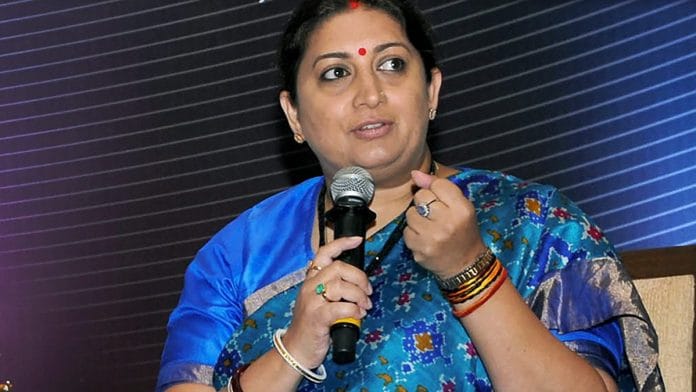At the heart of the backlash against the entry of women into Sabarimala temple and #MeToo is a common pattern – men still decide.
Union minister Smriti Irani weighed in on the Sabarimala issue this week saying, “Would you take a blood-soaked sanitary napkin to a friend’s place?” She quickly added that it is her personal opinion and that people have the right to pray but not the right to desecrate a place of worship.
A minister in the government has reiterated an age-old taboo around menstruation and re-stigmatised it in 2018.
The comment comes in the wake of a ‘progressive’ Supreme Court ruling that women of all age groups have a right to pay their respects to Lord Ayyappa at the Sabarimala temple. Let’s be clear – despite the ruling, not a single woman was ‘allowed’ to enter the shrine.
Also read: On Sabarimala, blame out-of-touch Indian liberal elite not the court
Smriti Irani was predictably called out for her misogynist and sexist statement that implies women’s menstruating bodies are unacceptable and impure. Clearly, Irani is not up to date with the online campaign that was started by poet Rupi Kaur’s “period-photo”. The Guardian even ran an article titled: We’re having a menstrual liberation: How periods got woke.
However, the scourge of such regressive thinking is not limited to primetime TV’s favourite ‘saas’ (mother-in-law) alone. It is part of a larger nexus of thinking where women’s identity can only be viewed through the male gaze and legitimised through male approval.
If you look closely enough, the same premise has been invoked in different ways to counter the mass movement #MeToo and the decriminalisation of adultery.
Benevolent patriarchy just won’t do
But as the battle for women’s right to selfhood rages, the debate has shifted. Women are no longer asking for ‘permission’, or ‘earning it’, as the euphemism goes, to exist in ‘male’ spaces.
India is at a tipping point, where women are demanding a right to these spaces, their bodies and the autonomy to make their own decisions.
In her response to Barkha Dutt, Tavleen Singh writes, “women like me are fighters”. Yes, they are. They are fighters, each in their own individual niche. They braved patriarchy at a time when collective silencing of women was the norm.
However, the war women now fight is no longer about a single soldier, it is about an army of women. #MeToo, and the attempt to reclaim women’s bodies as their own and not just as the passive objects of the male gaze, was never about one single woman alleging harassment. It is a collective challenge to male entitlement, and a thinly veiled threat: It ends, now.
Also read: Girls, why do you want to go to temples like Sabarimala at all?
Similarly, Sabarimala is a quest for access to spaces that have been captured in its entirety by men (and women outside the reproductive age). Who decides if god discriminates against menstruating women who are biologically in the reproductive age? Not men, not anymore.
The way the protests against the order allowing entry of women in Sabarimala have played out is a testament to the fact that despite the agitations, outcry, mass mobilisation and even state support, patriarchy’s foot soldiers march on strong. Misogyny is still trying to claim a monopoly over the right to decide what women can and cannot do, what spaces they can and cannot occupy. But the match has been lit, and no one can stop the fire.
Decriminalisation of adultery was a case in point for women’s right to sexual freedom, their basic right to choose and break the shackles of an often oppressive institution of patriarchy – marriage. No Swati Maliwal, it is not a legal sanction to have extramarital affairs. It is a legal assertion of female identity as autonomous individuals, collectively.
Fundamental rights don’t discriminate
There is a common underlying message in all these instances – fundamental rights do not discriminate on the basis of gender. Women categorically refuse to be silent bystanders as men ‘run’ the world. They will no longer be decorative pieces men use to adorn spaces they feel comfortable ‘allowing’ them.
Also read: Two women begin trekking up Sabarimala hill even as devotees continue to stage strong protests
It is a collective catharsis born out of decades of oppression and recently, appeasement. It’s unbridled female rage that says it will no longer tolerate being told ‘what to do,’ especially not when it masquerades as concern.
There’s a storm coming, dear foot soldiers of patriarchy. You better ‘batten down the hatches’, and learn to take care of yourselves, instead of kindly offering your unsolicited advice to independent women.







how innocent is our knowledgeable ex. HRD minister ?, if a woman is not supposed to enter in aforesaid temple then how she is allowed to enter in Hanuman temple, after all Lord Hanuman was also a brahamchari. Its politics of convenience not of values.